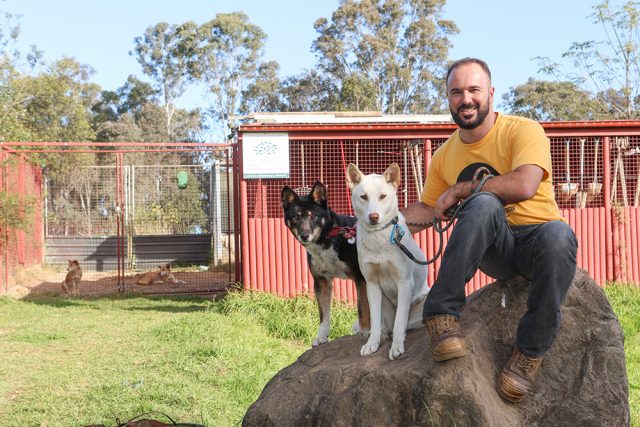Dingo Den is in danger of imminent closure. Deteriorating funds and dwindling volunteers have hit the Glenmore Park sanctuary hard, and the dingoes currently in care face an uncertain future.
Founder of Dingo Den Joshua Said said the facility is funded entirely by donations and is in desperate need of help.
“We’ve been going for as long as we can and we lost a lot of donors and support after COVID,” Said mentioned.
“We need at least $30,000 in the next period to keep going. We need around $114,000 a year to keep everything funded and operational and pay for their food and vet bills.”
If Dingo Den can’t stay operational, they will have to cease accepting dingo rescues and will no longer be able to support domestic dingo owners.
“We teach people how to care for dingoes so we can prevent them from becoming displaced; we also do a lot of campaigning to try and protect them,” Said stated as Ash the black dingo licked his cheek.
“The dingoes we have in care here – that will cease. We’ll have to work out what to do and where to keep the animals.
“We’re no-kill, so we won’t be putting them down, but there is not a clear path for them.”
Dingo Den used to offer animal experiences to bring in more funds, but that ceased four or five years ago when the Department of Primary Industries introduced new rules.
This is ironic because the need to rescue dingoes in the first place comes off the back end of government policy according to Said.
“We have two types of dingoes that come to us,” he said.
“One is domestic where people have had them as pets and need to rehome them for various reasons. We try and put those dingoes into foster care so they can continue to receive care in a domestic setting. The other half are our wild-born pups that are orphaned because the adults have been killed, shot, trapped or poisoned.”
When this happens, Dingo Den raises the puppies with the help of their core pack dingoes.
“That’s why the sanctuary was built as a native, natural space for them, and the core pack dingoes teach the puppies,” Said explained.
Said’s passion for the Aussie apex predator has become a life commitment that he hopes will continue.
“Over 10 years, we’ve had over 300 dingoes come through and many dingoes are with us for years,” Said recounted.
“It’s long-term care, a long-term investment, lots of training with volunteers, and lots of dedication.”
He hopes that one day, he will be able to safely re-wild dingoes, but that effort requires funding.
“They’re listed as a pest species, so it’s illegal to release them,” Said stated.
“We want to get the laws changed to protect them first, so then we can have some safe spaces to release them. Otherwise, they’re at risk of all that trapping, baiting and shooting.”
If you would like to volunteer or donate to save Dingo Den, visit the website at https://www.dingoden.net.

Ally Hall
Ally Hall joined the Weekender in 2024, and focuses on entertainment and community stories. She's a graduate of the University of South Australia and has previously worked as a Video Journalist with Southern Cross Austereo and as a News Reader with Australian Radio Network.

